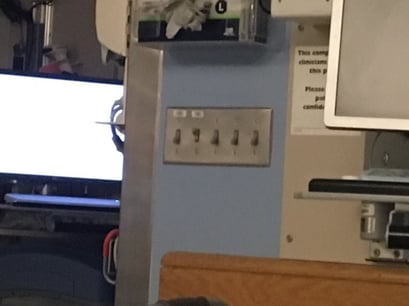A Blog About Understanding The Toyota Production System and Gaining Its Full Benefits, brought to you by "The Toast Guy"

Small Things
Last February I had the opportunity to observe healthcare providers up close and personal at one the world’s premier hospitals. “Who Cares for the Caregivers?” was written from the perspective of a patient in a cardiac step-down unit, sympathetically surveilling caregivers’ as they grappled with many small problems in their workday. Here is another story from the 8th-floor recovery area:

At 3:00 a.m., except for the sound of occasional call bells, the floor was quiet. Nurses and assistants quietly made rounds to dispense meds, check vitals and draw blood. Patients were resting quietly when I was awakened suddenly by a bright light over my bed. “Oh, sorry,” the CNA apologized as she turned off the light, “wrong bed.” She then switched a second light on, hoping to hit the mark. Again, “Oops, sorry.” Because the order of the switches on the panel did not correspond to the order of the lights above the beds, searching for bed lights had become routine. I drifted back to sleep, amused at this particular guesswork problem. Guesswork isn’t really work as the noun implies; it’s waste. This was a defect, which caused frustration for the CNA and a little bit of discomfort for the patients. Clinic staff was just expected to remember the order. I smiled because I’d seen a similar problem many years before in a totally different setting.
In 2003, I had been teaching a workshop at a local furniture manufacturer. A small corner of the company’s showroom had been cordoned off to act as our classroom. On the wall of our classroom was a light panel with eleven switches, each controlling a different area in the showroom and adjacent offices. As class began, to darken the classroom for projection, I flipped the switch that my intuition told me should correspond to the spotlights over my projection screen. “Hey, what’s going on?” came a question from the other side of the wall. “Sorry,” I replied as I hit the next switch for an instant and then the next, trying to turn off my lights and nobody else’s. After four tries, I finally got it right. While my class that day had nothing to do with visual control, we took a few minutes to label the switch panel, a simple way to address the rare occasion that all lights were not turned on or off at the same time. “It’s a small thing,” I told the class, “but you’ll never have that problem again.”
Back to February 2018, later in the morning as my nurse was leaving her shift, I asked her about the light panel. “How long as it been this way?” Apologetically, she replied, “Forever. Sorry to wake you last night, I usually remember the order of the lights, but last night I forgot.”
“You shouldn’t have to deal with a broken process,” I said, “why don’t you just label the switches?” She thought for a second and replied, “Good idea.” Before her shift was over, the two errant switches had been marked to clarify the lighting sequence over the beds. And, guess what? The following night lights were switched on without annoyance to staff or patients. When it was my turn for a visit from the CNA, I thanked her for fixing the problem. “It was a small thing,” she humbly replied. I thanked her again and responded, “Yes, but you’ll never have the problem again.”
How many “small things” does it take to change a person’s outlook – or to change an organization? What do you think? I'd love to hear your thoughts & experiences on the matter.

O.L.D.
By the way, now is a great time to snag early bird pricing for GBMP's annual Lean Conference. It's our 15th year and we'll be in Hartford, CT on October 23-24, 2019. Visit www.NortheastLeanConference.org to learn more. It's just another small thing you can do that will save you money and help to accelerate your Lean efforts in 2019.